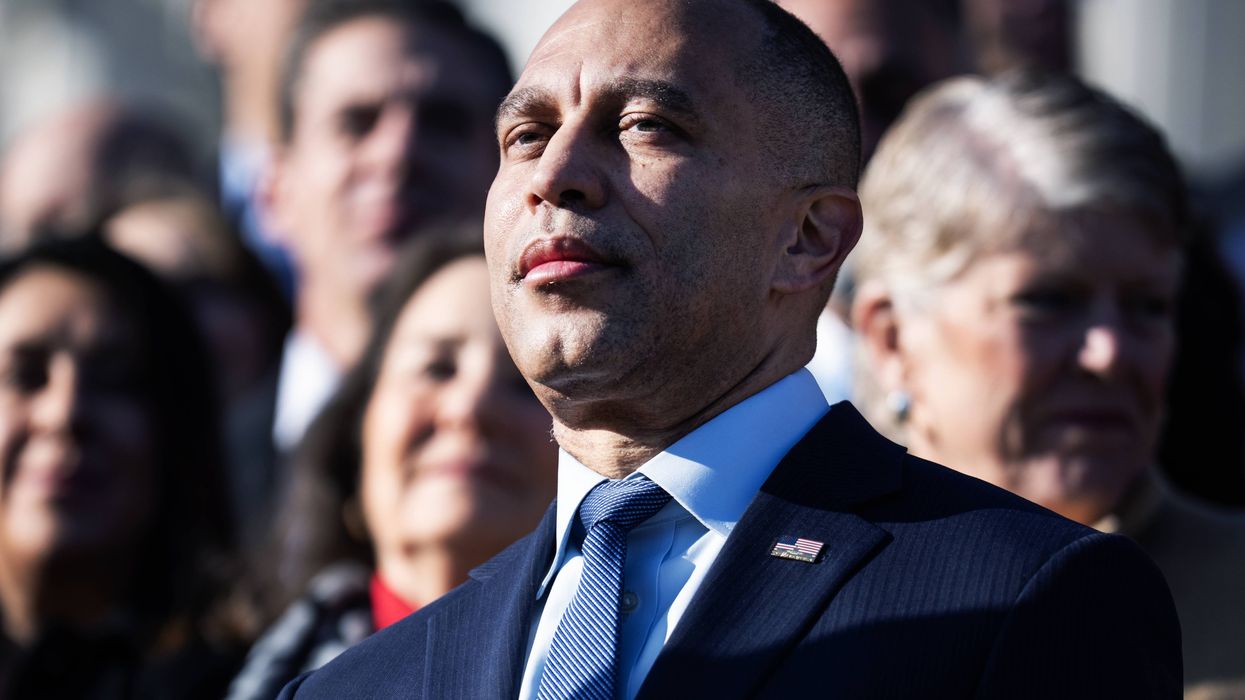March, 18 2020, 12:00am EDT

During COVID-19 State of Emergency, Transparency and Public Access to Government Proceedings Must Be Maintained
As public officials at every level of government wrestle with the challenges of the COVID-19 pandemic, including implementation of social distancing measures that impact the public's ability to attend government meetings and other proceedings, Common Cause encourages public officials to adopt emergency measures to protect public health while maximizing transparency and remote public participation and limiting government business to priority functions necessary under the current emergency conditions.
WASHINGTON
As public officials at every level of government wrestle with the challenges of the COVID-19 pandemic, including implementation of social distancing measures that impact the public's ability to attend government meetings and other proceedings, Common Cause encourages public officials to adopt emergency measures to protect public health while maximizing transparency and remote public participation and limiting government business to priority functions necessary under the current emergency conditions.
"The COVID-19 pandemic presents an unprecedented challenge to our institutions of government, but public officials can and must do everything reasonably possible to maximize transparency and remote public access to government meetings and proceedings," said Karen Hobert Flynn, president of Common Cause. "Americans expect and deserve the ability to oversee and participate in government decision making. While it is crucial for public officials to follow the guidance of public health officials, it is likewise crucial for public officials to ensure that government business conducted at this extraordinary time be as transparent as possible, with opportunities for public participation via videoconference, teleconference and through written testimony. Further, governments must pursue strategies to continue functioning just as companies, organizations, schools, and service providers are adapting widely-available technology to facilitate their work. Our priorities may have shifted, but that does not mean democracy goes on hiatus. In addition to accomplishing priority functions such as budgets, pandemic response legislation, and recovery planning, government needs to be working to make sure people can both be safe and continue to exercise their right to vote."
The United States Centers for Disease Control and Prevention (CDC) has recommended that in-person events that consist of 50 people or more be canceled or postponed. The White House has advised people to avoid social gatherings of more than 10 people. Some jurisdictions have ordered residents to shelter at home for the coming weeks. Consistent with this advice, public officials from coast to coast have postponed or shortened legislative sessions and have limited public access to government buildings and meetings. For example, California Governor Gavin Newsom has issued an emergency executive order that, among other measures, suspends application of certain provisions of the state's open meetings laws by allowing local government agencies to hold meetings telephonically or electronically without public access to the meeting site.
Common Cause urges strict compliance with CDC guidance and the guidance of state and local public health officials. It is understandable that public officials are curtailing legislative sessions and limiting the public's in-person access to government proceedings. However, public confidence in government is more important during a time of crisis than ever. Public officials must do everything in their power to maximize the ability of the public to continue observing and participating in government proceedings, following these recommendations where possible:
- Postpone non-priority government action until the state of emergency has ended.
- Provide widespread public notice of scheduled government proceedings.
- Provide public access to observe government proceedings via live and recorded video available on government websites.
- Provide public ability to participate in government proceedings via videoconference where possible and, at a minimum, via telephone and submission of written testimony.
- Require all members of a public body participating in a meeting or proceeding to be clearly audible and visible at all times, including to the public.
- At the start of the meeting, require the chair to announce the names of any members of the public body participating remotely.
- In the event audio or video coverage of a proceeding or meeting is interrupted, require the presiding official to suspend discussion until audio/video is restored.
- Require all votes to be roll call votes.
- At the beginning of any executive session, require all members of the public body to state that no other person is present or can hear them.
- Record all open sessions of meetings and make such recordings available to the public via government website.
Any reduction in public transparency and public participation in government proceedings must not be exploited by any political party or interest group for personal, partisan or other political gain. The same rules of access must apply to everyday Americans and well-connected lobbyists. This is a time for our country to be united to protect each other as we face COVID-19, and that includes respecting and protecting public participation in and oversight of government.
To view this release online, click here.
Common Cause is a nonpartisan, grassroots organization dedicated to upholding the core values of American democracy. We work to create open, honest, and accountable government that serves the public interest; promote equal rights, opportunity, and representation for all; and empower all people to make their voices heard in the political process.
(202) 833-1200LATEST NEWS
Democrats to Spotlight Trump Election Threats at January 6 Hearing
A panel aimed at fighting GOP efforts to "rewrite history" regarding the US Capitol attack will also "examine ongoing threats to free and fair elections posed by an out-of-control Trump administration."
Dec 30, 2025
At a hearing on the fifth anniversary of the January 6, 2021 attack on the US Capitol next week, House Democrats plan to look back as well as forward—countering Republicans' efforts to "rewrite history and whitewash" the attempted insurrection by President Donald Trump's supporters and warning of the GOP's threats to upcoming elections and to US democracy.
The event next Tuesday will be an unofficial one, as Democrats are in the minority and do not have the authority to call formal hearings.
House Minority Leader Hakeem Jeffries (D-NY) said in a Dear Colleague letter to other lawmakers on Monday that the hearing would shed light on the "toxic priorities" of Trump, who after taking office in January issued blanket pardons for nearly 1,600 people who were charged in connection to the January 6 attack.
" Donald Trump promised to lower the high cost of living on day one of his presidency," wrote Jeffries. "One year later, costs are out of control, America is too expensive, and Republicans believe that the affordability crisis is a hoax. They have done nothing to lower costs for everyday Americans, but are gutting healthcare and enacted massive tax breaks for their billionaire donors."
While doing nothing to make life more affordable for families—and helping to make household grocery and electricity bills higher—Trump has pardoned hundreds of people who "brutally assaulted law enforcement officers" on January 6, including several who have been charged with new crimes and "a troubling number" who "have been arrested for child molestation, sexual assault, and kidnapping," said the Democratic leader.
"Republicans own the failed economy, their broken promise to lower costs, and the crime spree the dangerous criminals pardoned by the president have visited on our country," wrote Jeffries.
The mob on January 6 attempted to stop the certification of the 2020 election, which Trump had spent weeks at that point insisting had been stolen from him and which the president and his allies continue to deny was won by former President Joe Biden.
But Republicans including House Speaker Mike Johnson (R-La.) have made efforts to sanitize the attack, which took place after Trump held a rally urging his supporters to march "over to the Capitol building to peacefully and patriotically make your voices heard" and said they would see whether "Republicans stand strong for integrity of our elections."
After Trump took office this year, Johnson announced a new congressional subcommittee that would expose "the false narratives peddled by” the previous bipartisan panel that issued a report in 2022 about Trump's efforts to overturn the 2020 election results and his encouragement of the attack.
Rep. Bennie Thompson (D-Miss.), who led the bipartisan committee, will also oversee next Tuesday's hearing.
In addition to exposing "the election deniers who hold high-level positions of significance in the executive branch," wrote Jeffries on Monday, the panel "will examine ongoing threats to free and fair elections posed by an out-of-control Trump administration."
The president has pushed Republican-led state legislatures in Texas, Missouri, North Carolina, and other states to draw new congressional maps to help the GOP maintain power in the 2026 midterm elections.
He signed an executive order in March that purported to require proof of citizenship for people who register to vote—an effort that was blocked by a federal judge in October—and the US Department of Justice has sued several states to compel them to share voter registration data with the federal government.
Legal experts have emphasized that the president does not have the authority to change how elections are run, despite Trump's continued efforts.
Jeffries said the January 6th Select Committee would join Thompson in leading the hearing, which is scheduled for 10:00 am Eastern time next Tuesday.
Keep ReadingShow Less
'This Is an Act of War': CIA Carried Out Drone Strike on Port Facility Inside Venezuela
One expert called the reported drone strike a "violation of Article 2(4) of the UN Charter and the Take Care Clause of the Constitution."
Dec 30, 2025
The US Central Intelligence Agency reportedly carried out a drone strike earlier this month on a port facility inside Venezuela, marking the first time the Trump administration launched an attack within the South American country amid a broader military campaign that observers fear could lead to war.
CNN on Monday was first to report the details of the CIA drone strike, days after President Donald Trump suggested in a radio interview that the US recently took out a "big facility" in Venezuela, prompting confusion and alarm. Trump authorized covert CIA action against Venezuela in October.
According to CNN, which cited unnamed sources, the drone strike "targeted a remote dock on the Venezuelan coast that the US government believed was being used by the Venezuelan gang Tren de Aragua to store drugs and move them onto boats for onward shipping."
To date, the Trump administration has not provided any evidence to support its claim that boats it has illegally bombed in international waters were involved in drug trafficking. No casualties were reported from the drone strike, and the Venezuelan government has not publicly commented on the attack.
"This is an act of war and illegal under both US and international law, let’s just be clear about that," journalist Mehdi Hasan wrote in response to news of the drone strike.
Brian Finucane, senior adviser with the US Program at the International Crisis Group, called the reported drone attack a "violation of Article 2(4) of the UN Charter and the Take Care Clause of the Constitution."
"Seemingly conducted as covert action and then casually disclosed by POTUS while calling into a radio show," he added.
CNN's reporting, later corroborated by the New York Times, came after the Trump administration launched its 30th strike on a vessel in international waters, bringing the death toll from the lawless military campaign to at least 107.
The Times reported late Monday that "it is not clear" if the drone used in last week's mission "was owned by the CIA or borrowed from the US military."
"The Pentagon has stationed several MQ-9 Reaper drones, which carry Hellfire missiles, at bases in Puerto Rico as part of the pressure campaign," the Times added.
Keep ReadingShow Less
30th Strike in Trump's High-Seas Kill Spree Claims 2 More Lives
At least 107 people have been killed in US bombings of boats that the Trump administration claims—without evidence—were involved in narco-trafficking in the Caribbean Sea and Pacific Ocean.
Dec 29, 2025
The US military said Monday that two alleged drug smugglers were killed in the bombing of another boat in the eastern Pacific Ocean, but—as has been the case throughout 30 such strikes—offered no verifiable evidence to support its claim.
US Southern Command (SOUTHCOM) said on X that, on orders from Defense Secretary Pete Hegseth, "Joint Task Force Southern Spear conducted a lethal kinetic strike on a vessel operated by Designated Terrorist Organizations in international waters."
"Intelligence confirmed the vessel was transiting along known narco-trafficking routes in the eastern Pacific and was engaged in narco-trafficking operations," SOUTHCOM added. "Two male narco-terrorists were killed. No US military forces were harmed."
According to the Trump administration's figures, at least 107 people have been killed in 30 boat strikes since early September. The administration has tried to justify the strikes to Congress by claiming that the US is in an “armed conflict” with drug cartels, while legal scholars and Democratic US lawmakers counter that the bombings are likely war crimes.
War powers resolutions aimed at reining in President Donald Trump’s ability to extrajudicially execute alleged drug traffickers in or near Venezuela failed to pass the Senate in October and the House earlier this month.
Monday's strike came amid Trump's escalating aggression against Venezuela, including the deployment of warships and thousands of US troops to the region, authorization of covert CIA operations targeting the country's socialist government, and threats to launch ground attacks.
Trump claimed Monday without providing evidence that US forces destroyed a "big facility" in an unspecified country where narco-traffickers' "ships come from."
Keep ReadingShow Less
Most Popular


